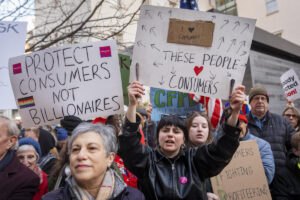In a dramatic turn of events, the Trump administration is strategizing to significantly weaken the Consumer Financial Protection Bureau (CFPB), with plans to terminate 95% of its staff and cancel its lease in Washington, D.C. These moves are at the center of a federal lawsuit aiming to block the administration’s drastic measures.
Impact of Mass Layoffs
If the administration’s plans come to fruition, the CFPB could be left with only a skeletal workforce. Established as a watchdog for consumers, the CFPB plays a pivotal role in ensuring that financial institutions—ranging from large banks to payday lenders—operate fairly and transparently. The potential downsizing raises concerns not only for the agency’s immediate ability to function but also about the long-term repercussions for consumer protection in the financial sector.
In the wake of these announcements, the CFPB has effectively come to a standstill, halting all operations under the directive of Acting Director Russell Vought. Staff have been instructed to work from home, and initial layoff notifications have started to roll out, causing alarm among employees and stakeholders alike.
Administration’s Agenda Revealed
Administration insiders have made no secret of their intent to dismantle the agency. A striking highlight from the week was Elon Musk’s tweet celebrating these efforts, adding a layer of high-profile scrutiny to the situation. President Trump, reiterating his endorsement of this drastic overhaul, called the CFPB “a waste” of resources and expressed the necessity of eliminating what he described as a "vicious group" of officials.
In a legal challenge mounted by a federal employees union and nonprofit organizations reliant on the CFPB’s consumer protection mandates, the lawsuit accuses the administration of creating chaos and inflicting irreversible harm on consumers nationwide. It emphasizes that halting oversight over financial institutions could jeopardize millions of consumers who rely on the agency for support and protection.
Legal Challenges and Implications
The legal action seeks to counteract the stop-work orders and halt any further layoffs, arguing that these measures strip the CFPB of its ability to operate as mandated by federal law. The CFPB typically handles hundreds of thousands of consumer complaints each month, and any disruption could result in an enforcement vacuum that exposes vulnerable customers to predatory practices.
The lawsuit also mentions that Vought plans to return the bureau’s operating reserves to the Federal Reserve, claiming the CFPB won’t need additional funding for the quarter due to a decision to spend down its current reserves. This decision poses questions about the agency’s sustainability and the resources needed to fulfill its critical functions.
The Bigger Picture
The current crisis surrounding the CFPB represents a significant test of the administration’s capacity to reshape federal agencies and sidestep traditional legislative processes. Established post-2008 financial crisis to protect consumers from dubious financial practices, the CFPB was birthed from the Dodd-Frank Act. The ongoing lawsuit highlights the contention that only Congress has the authority to disband such an agency, emphasizing the constitutional checks and balances that play a crucial role in maintaining regulatory oversight.
Moreover, this scenario isn’t isolated; rumors suggest that other government entities, including the Department of Housing and Urban Development, may face similar cuts. As courts have temporarily stalled some layoffs in related agencies, the unfolding events will have far-reaching implications for the future of consumer protection and regulatory oversight in the United States.
As the hearing regarding the CFPB case approaches, all eyes are on the judiciary and the potential repercussions for federal governance and consumer rights. The situation is fluid, but it is evident that the fate of the CFPB could reshape the landscape of financial regulation for years to come.
Stay tuned to Extreme Investor Network for the latest updates on this developing story, as we navigate the complex intersection of finance, policy, and consumer rights. Your ability to invest, protect your assets, and navigate financial challenges is our priority, and we will keep you informed on what matters most.

